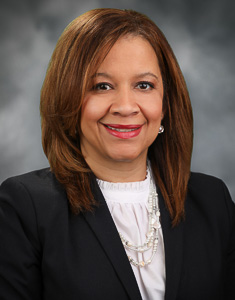Angela Richard-Eaglin, Assistant Professor

Black History Month is an annual celebration of achievements of black Americans and a time for recognizing the central role of African-Americans in U.S. History. This month, we sat down with faculty, staff and students to discuss their entry into the nursing field, how they became nursing leaders and how to improve diversity in nursing.
Angela Richard-Eaglin, DNP, FNP-BC, CNE, FAANP, assistant professor, joined Duke University School of Nursing in 2016 and leads our VA Nursing Academic Partnership in Graduate Education program.
Q: What inspired you to pursue the field of nursing?
A: I am passionate about health and wellness and have literally always had an interest in health care. As a child, I always enjoyed being the person to clean up my family's scrapes and scratches.
Q: What is one thing either personally or professionally that you credit with making you who you are today as a nursing leader?
A: My devotion for social justice, health equity, and people, especially vulnerable populations is what I credit for impacting my nursing leadership.
Q: How do we continue to improve diversity in clinical practice, education, research, leadership, etc.?
A: We continue to improve diversity in all of these areas by 1) creating psychological safe spaces for health professionals to allow themselves to be vulnerable in acknowledging biases that negatively impact diversity, inclusion, and belonging in all of these areas; 2) not enabling inequities by ignoring or minimizing incidents that impede progress toward successfully achieving diversity and belonging initiatives; 3) transparency and honest conversation around diversity issues; and 4) implementation of intentional and impactful strategies and action plans, including ongoing evaluation, that directly contribute to improving diversity outcomes.